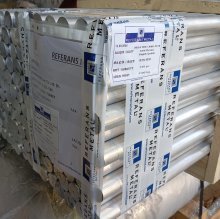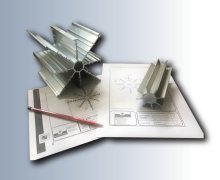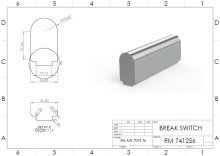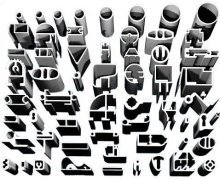



7175
EN 2512 / AlZn5.5MgCu(B) / 7175 / T7351
| Chemical Properties | % Value |
| Silicon (Si) | 0,00 - 0,15 |
| Tin (Sn) | 0,00 - 0,00 |
| Chromium (Cr) | 0,18 - 0,28 |
| Manganese (Mn) | 0,00 - 0,10 |
| Magnesium (Mg) | 2,10 - 2,90 |
| Copper (Cu) | 1,20 - 2,00 |
| Lead (Pb) | 0,00 - 0,00 |
| Titanium (Ti) | 0,00 - 0,06 / 0,08 - 0,15 |
| Iron (Fe) | 0,00 - 0,20 |
| Zinc (Zn) | 5,10 - 6,10 |
| Nickel (Ni) | 0,00 - 0,00 |
| Aluminium (Al) | Balance |
| Physical Properties | Value |
| Density | 2,80 g/cm³ |
| Melting Point | 477 °C |
| Thermal Expansion | 23.4 µm/m.°C |
| Modulus of Elasticity | 72 GPa |
| Thermal Conductivity | 155 W/m.K |
| Electrical Resistivity | 33 % IACS |
| Mechanical Properties | Value |
| Proof Strength | 435 MPa |
| Yield Strength | 505 MPa |
| Shear Strength | 300 MPa |
| Elongation A50 mm | 13% |
| Hardness | 135 HB |
The 7175 T7351 aluminum alloy is known for its high strength, excellent corrosion resistance, and good machinability. The T7351 temper represents a heat-treated form of the alloy, providing it with increased durability and hardness. These properties make 7175 T7351 ideal for use in demanding applications such as aerospace, defense, and other high-performance industrial sectors. Additionally, 7175 T7351 aluminum is suitable for anodizing, which enhances its surface appearance while improving its corrosion resistance.
In terms of weldability, 7175 T7351 aluminum alloy can be welded, but its high strength can present challenges during the welding process. Strong and reliable welds can be achieved with proper welding techniques and heat treatment. Regarding bending, 7175 T7351 aluminum is more difficult to bend due to its high hardness. However, with the appropriate machinery and techniques, it can still be shaped, making it suitable for structural applications.
The corrosion resistance of 7175 T7351 is outstanding, especially in atmospheric conditions, and it offers excellent resistance to corrosive environments such as seawater. This makes it ideal for maritime and outdoor structural applications. Additionally, 7175 T7351 aluminum alloy can be used in high-vibration environments, making it advantageous in industries such as automotive, aerospace, and defense. Its high durability and long-lasting performance enhance its reliability in these dynamic applications.
The advantages of 7175 T7351 aluminum alloy include high mechanical strength, corrosion resistance, anodizing compatibility, weldability, and suitability for high-vibration environments. However, its high hardness requires careful handling during bending and welding processes. Additionally, this alloy may not be as easy to machine as more flexible alloys. Despite these challenges, 7175 T7351 is an excellent choice for industrial applications that require high performance and durability.
Choosing Factors for 7175 T7351
- Strength: High
- Machining: Good
- Weldability: Weak
- Formability: Medium
- Corrosion Resistance: Okay
- Heat Treating: Yes
Some Well-Known Applications for 7175 T7351
As structural components for the aerospace industry,
In automobile parts such as gears and shafts,
It is also used in high strength aircraft parts.
- Round/Flat Bar
- Tube/Profile
- Plate

 حساب الوزن
حساب الوزن

